推荐下载 联合国会议发言稿在联合国气候变化会议上的讲话(中英对照)-最新
联合国气候峰会各国发言稿

联合国气候峰会各国发言稿尊敬的联合国秘书长、各位尊敬的各国领导人、女士们、先生们,大家好!首先,我要感谢联合国气候峰会组织委员会的精心组织和各国代表的积极参与,让我们能够在这里共同讨论气候变化、环境保护和可持续发展的重要议题。
气候变化不仅仅是个别国家的问题,而是全球范围内的挑战。
只有通过共同合作和努力,才能有效地应对这一挑战,保护地球的生态环境,确保人类的可持续发展。
作为地球上不同国家的代表,我们应该共同承担起应对气候变化的责任。
我们不能再抱着各自为政的态度,而应该在共同的框架下制定全球性的气候变化应对方案。
作为发达国家,我们应该更多地为发展中国家提供支持和帮助,帮助他们提高气候变化应对能力,推动全球减排目标的实现。
作为发展中国家,我们也应该积极采取措施,减少温室气体排放,促进可持续发展。
当前,全球气候变化对生态环境和人类生活产生了严重的影响。
极端天气事件频频发生,海平面上升,冰川融化,林火、水灾等自然灾害频发。
这些现象提醒我们,必须采取行动,保护我们的地球家园。
我们不仅要在峰会上做出承诺,更要在日常生活中积极参与环保活动,减少碳排放,保护生态环境。
在此,我代表我国重申我们的气候变化应对承诺。
我们将继续采取积极的行动,减排温室气体,发展可再生能源,控制工业排放,推动低碳经济发展。
我们也将加大对发展中国家的支持,帮助他们提高气候变化应对能力,推动全球气候变化治理进程。
同时,我们也呼吁其他国家加大气候变化应对的力度,让我们共同努力,为全球环境保护和可持续发展作出贡献。
在这里,我也想重申我们的责任。
气候变化是全球性的问题,没有哪个国家可以独善其身。
我们必须共同行动,共同应对,通过合作推动全球气候治理进程。
我们将不遗余力地履行我们的国际义务,加大对发展中国家的支持,推动全球气候变化治理进程,为人类的未来和地球的未来做出贡献。
最后,我希望在此峰会上能够取得实质性的成果,达成共识,共同制定出更为具体的应对气候变化的方案和目标。
美国国务卿克林顿在出席联合国气候变化框架大会期间发表讲话(精选五篇)

美国国务卿克林顿在出席联合国气候变化框架大会期间发表讲话(精选五篇)第一篇:美国国务卿克林顿在出席联合国气候变化框架大会期间发表讲话美国国务卿克林顿在出席联合国气候变化框架大会期间发表讲话,宣布在达成协议的前提下,美国准备与其他国家合作,在2020年前每年共同提供1,000亿美元,用于满足发展中国家适应气候变化的各种需要。
以下是演讲稿中英文对照版本:Thank you all for coming this morning.I arrived in Copenhagen several hours ago.I’ve just had a briefing on the state of the negotiations.I'd like to give you a brief report on where we stand and then make an announcement.谢谢诸位今天上午来到这里。
几小时前,我才抵达哥本哈根。
我刚听取了有关谈判目前状况的介绍。
我想简单地向诸位谈谈我们的立场,然后宣布有关行动。
First, let me thank T odd Stern and the terrific team representing the United States at this conference.Actually, they’ve been representing us ever since the beginning of the Obama Administration over this past year.首先,我感谢托德·斯特恩(Todd Stern)以及代表美国出席这次大会的优秀的代表团成员。
事实上,自奥巴马政府开始执政一年来,他们始终担任我们的代表。
We appointed Todd Stern as our first-ever Special Envoy for Climate Change because we understood that this is one of the most urgent global challenges of our time, and it demands a global solution.Climate change threatens not only our environment, but our economy and our security--this is an undeniable and unforgiving fact.我们任命托德·斯特恩为我们的首位气候变化事务特使,是因为我们认识到这是我们时代面临的最紧迫的全球挑战之一,需要有全球性的对策。
联合国气候大会发言稿英文版

联合国气候大会发言稿英文版English:Ladies and gentlemen, as we gather here today for the United Nations Climate Conference, it is imperative for us to acknowledge the severity of the climate crisis and the urgent need for global action. The devastating impacts of extreme weather events, rising sea levels, and loss of biodiversity have already disrupted the lives of millions of people and entire ecosystems. It is time for us to come together and commit to ambitious targets for reducing greenhouse gas emissions and transitioning to renewable energy sources. We must also address the disproportionate burden of climate change on vulnerable communities and ensure that they have access to the resources and support they need to adapt and mitigate the impacts. The time for empty promises and half-hearted measures is over. We must act with a sense of urgency and determination to protect the planet for future generations.中文翻译:女士们,先生们,当我们今天聚集在联合国气候大会上时,我们必须承认气候危机的严重性以及全球行动的迫切需要。
气候变英语演讲稿
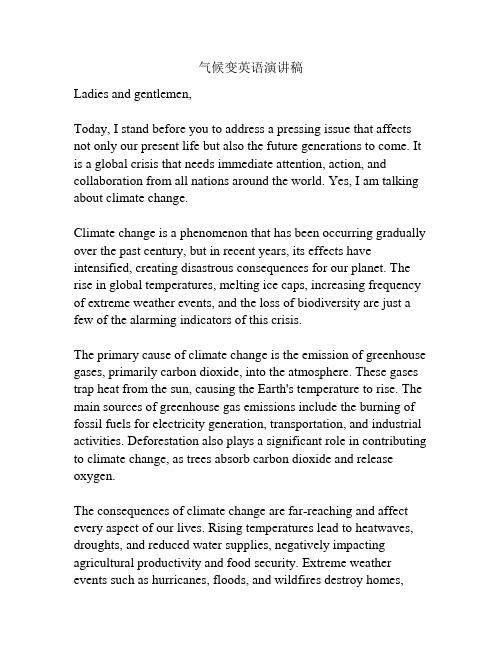
气候变英语演讲稿Ladies and gentlemen,Today, I stand before you to address a pressing issue that affects not only our present life but also the future generations to come. It is a global crisis that needs immediate attention, action, and collaboration from all nations around the world. Yes, I am talking about climate change.Climate change is a phenomenon that has been occurring gradually over the past century, but in recent years, its effects have intensified, creating disastrous consequences for our planet. The rise in global temperatures, melting ice caps, increasing frequency of extreme weather events, and the loss of biodiversity are just a few of the alarming indicators of this crisis.The primary cause of climate change is the emission of greenhouse gases, primarily carbon dioxide, into the atmosphere. These gases trap heat from the sun, causing the Earth's temperature to rise. The main sources of greenhouse gas emissions include the burning of fossil fuels for electricity generation, transportation, and industrial activities. Deforestation also plays a significant role in contributing to climate change, as trees absorb carbon dioxide and release oxygen.The consequences of climate change are far-reaching and affect every aspect of our lives. Rising temperatures lead to heatwaves, droughts, and reduced water supplies, negatively impacting agricultural productivity and food security. Extreme weather events such as hurricanes, floods, and wildfires destroy homes,infrastructure, and livelihoods. Sea-level rise poses a severe threat to coastal communities, displacing millions of people and causing mass migrations. Furthermore, the loss of biodiversity results in the disruption of ecosystems, leading to negative cascading effects on plant and animal species.However, it is not too late to take action and mitigate the effects of climate change. We must act now, with a sense of urgency and collective responsibility. Governments, businesses, communities, and individuals must work together to reduce greenhouse gas emissions and transition to a low-carbon economy.One of the key solutions is transitioning to renewable energy sources such as solar, wind, and hydroelectric power. These sources are abundant, clean, and do not emit greenhouse gases during operation. Governments should invest in renewable energy infrastructure and provide incentives for businesses and individuals to switch to greener alternatives. Additionally, we should focus on energy efficiency measures to reduce the overall energy demand.Another important step is to promote sustainable practices in agriculture and forestry. This includes reducing deforestation, promoting reforestation and afforestation programs, and implementing sustainable farming practices that reduce greenhouse gas emissions. By adopting sustainable land management strategies, we can preserve ecosystems, biodiversity, and ensure food security for future generations.Furthermore, we must raise awareness and educate the public about climate change and its consequences. It is crucial tocommunicate the urgency of this crisis and the individual actions that each of us can take to make a difference. Small changes in our daily lives, such as reducing our energy consumption, recycling, and adopting sustainable transportation options, can have a significant impact when scaled up globally.International cooperation is also vital in combating climate change. The Paris Agreement, signed by nearly all countries in 2015, is a significant step towards global cooperation. It sets a framework for countries to work together to limit global warming to well below 2 degrees Celsius and strive for 1.5 degrees Celsius. However, more ambitious actions need to be taken to achieve these targets.In conclusion, climate change is not a problem that we can afford to ignore or delay action on. The consequences are already being felt, and if we do not act now, the future generations will suffer the irreparable damage caused by our indifference. It is our moral responsibility to leave a habitable planet for our children and grandchildren. Let us come together, unite our efforts, and take the necessary steps to combat climate change and safeguard the future of our planet.Thank you.继续写相关内容,1500字尊敬的各位领导、女士们、先生们,感谢大家对于应对气候变化这一全球性危机的关注与支持。
模拟联合国气候发言稿范文
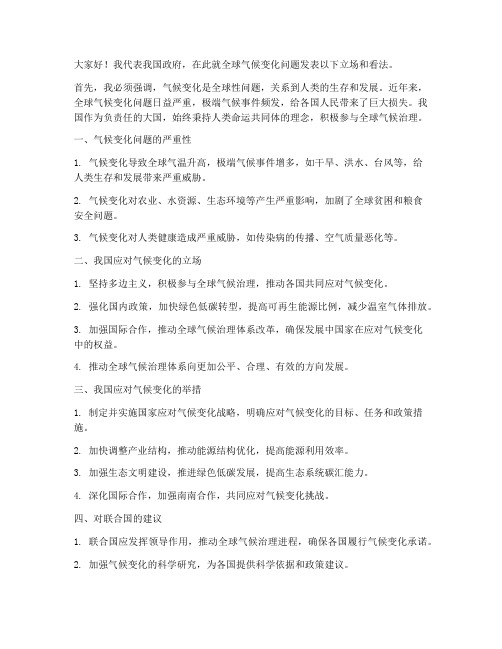
大家好!我代表我国政府,在此就全球气候变化问题发表以下立场和看法。
首先,我必须强调,气候变化是全球性问题,关系到人类的生存和发展。
近年来,全球气候变化问题日益严重,极端气候事件频发,给各国人民带来了巨大损失。
我国作为负责任的大国,始终秉持人类命运共同体的理念,积极参与全球气候治理。
一、气候变化问题的严重性1. 气候变化导致全球气温升高,极端气候事件增多,如干旱、洪水、台风等,给人类生存和发展带来严重威胁。
2. 气候变化对农业、水资源、生态环境等产生严重影响,加剧了全球贫困和粮食安全问题。
3. 气候变化对人类健康造成严重威胁,如传染病的传播、空气质量恶化等。
二、我国应对气候变化的立场1. 坚持多边主义,积极参与全球气候治理,推动各国共同应对气候变化。
2. 强化国内政策,加快绿色低碳转型,提高可再生能源比例,减少温室气体排放。
3. 加强国际合作,推动全球气候治理体系改革,确保发展中国家在应对气候变化中的权益。
4. 推动全球气候治理体系向更加公平、合理、有效的方向发展。
三、我国应对气候变化的举措1. 制定并实施国家应对气候变化战略,明确应对气候变化的目标、任务和政策措施。
2. 加快调整产业结构,推动能源结构优化,提高能源利用效率。
3. 加强生态文明建设,推进绿色低碳发展,提高生态系统碳汇能力。
4. 深化国际合作,加强南南合作,共同应对气候变化挑战。
四、对联合国的建议1. 联合国应发挥领导作用,推动全球气候治理进程,确保各国履行气候变化承诺。
2. 加强气候变化的科学研究,为各国提供科学依据和政策建议。
3. 支持发展中国家提高应对气候变化的能力,加大资金、技术、人才等方面的支持。
4. 推动全球气候治理体系改革,确保各国在应对气候变化中的权益。
尊敬的各位代表,气候变化问题事关全人类的未来。
让我们携手努力,共同应对气候变化挑战,为子孙后代创造一个美好的家园。
谢谢大家!。
潘基文联合国大会开幕式英语演讲稿:关注气候变化,推动可持续发展
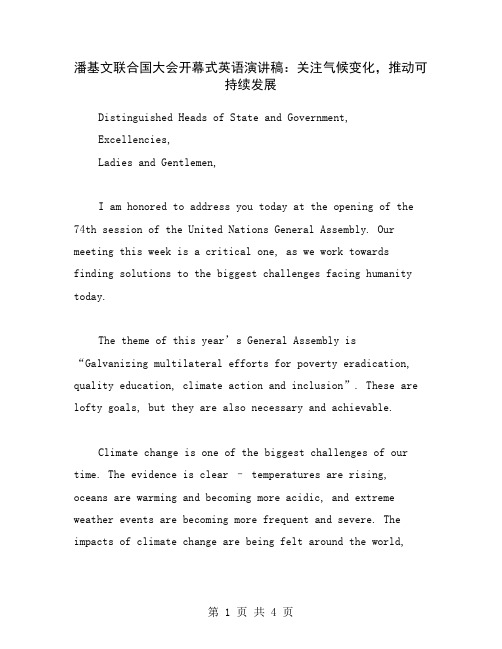
潘基文联合国大会开幕式英语演讲稿:关注气候变化,推动可持续发展Distinguished Heads of State and Government,Excellencies,Ladies and Gentlemen,I am honored to address you today at the opening of the 74th session of the United Nations General Assembly. Our meeting this week is a critical one, as we work towards finding solutions to the biggest challenges facing humanity today.The theme of this year’s General Assembly is “Galvanizing multilateral efforts for poverty eradication, quality education, climate action and inclusion”. These are lofty goals, but they are also necessary and achievable.Climate change is one of the biggest challenges of our time. The evidence is clear – temperatures are rising, oceans are warming and becoming more acidic, and extreme weather events are becoming more frequent and severe. The impacts of climate change are being felt around the world,from melting glaciers and rising sea levels to extreme droughts and floods.We are seeing the effects of climate change not only in our natural environment but also in our social and economic systems. Climate change is exacerbating poverty, hunger, and inequality, and threatening the security and stability of nations.The Paris Agreement, adopted four years ago, was ahistoric achievement in the fight against climate change. But, we cannot be complacent. The world is not on track to meetthe goals of the Paris Agreement, and the recent IPCC report makes it clear that we must do more and do it quickly.We need urgent and ambitious action to reduce greenhouse gas emissions, to adapt to the impacts of climate change, and to transform our economies and societies to be moresustainable and resilient.We need to focus not only on mitigation but also on adaptation and resilience. We must ensure that the most vulnerable are protected and that nobody is left behind.We need a sustainable and equitable transition to low-carbon and climate-resilient economies. This means phasing out fossil fuels and embracing renewable energy, investing in green infrastructure, and promoting sustainable agriculture.We need to work together as a global community to address climate change. The United Nations will continue to play a central role in this effort, bringing together governments, civil society, the private sector, and other stakeholders to find common solutions.This week, the Climate Action Summit will provide an opportunity for leaders from all sectors to come together and make new commitments to climate action. We need concrete and ambitious commitments to reduce emissions, build resilience, and finance the transition to a sustainable, low-carbon future.We must also work towards achieving the Sustainable Development Goals, which provide a roadmap for a sustainable and prosperous future for all. Poverty eradication, quality education, and inclusion are all essential components of this agenda.In conclusion, let me emphasize that the time for action is now. We cannot continue on our current path of unsustainable development. We must act with urgency and ambition to address the challenges of climate change and ensure a sustainable and prosperous future for all.We have the tools, the knowledge, and the resources to make this happen. What we need now is the political will, the leadership, and the commitment to take bold action. I urgeall leaders to rise to this challenge and to work towards a sustainable and equitable future for all. Thank you.。
联合国气象大会发言稿英文
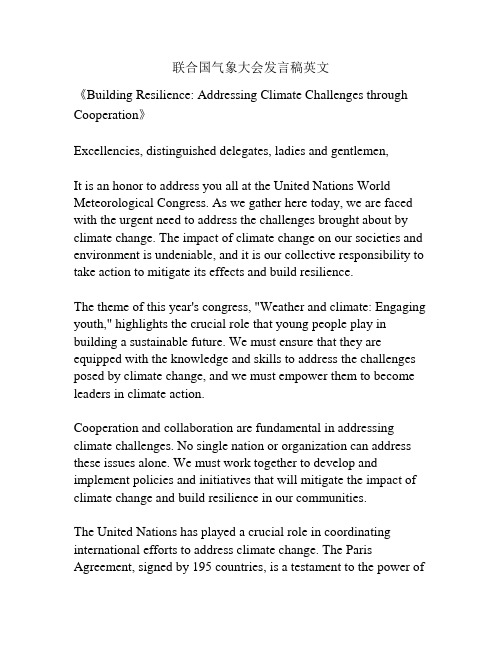
联合国气象大会发言稿英文《Building Resilience: Addressing Climate Challenges through Cooperation》Excellencies, distinguished delegates, ladies and gentlemen,It is an honor to address you all at the United Nations World Meteorological Congress. As we gather here today, we are faced with the urgent need to address the challenges brought about by climate change. The impact of climate change on our societies and environment is undeniable, and it is our collective responsibility to take action to mitigate its effects and build resilience.The theme of this year's congress, "Weather and climate: Engaging youth," highlights the crucial role that young people play in building a sustainable future. We must ensure that they are equipped with the knowledge and skills to address the challenges posed by climate change, and we must empower them to become leaders in climate action.Cooperation and collaboration are fundamental in addressing climate challenges. No single nation or organization can address these issues alone. We must work together to develop and implement policies and initiatives that will mitigate the impact of climate change and build resilience in our communities.The United Nations has played a crucial role in coordinating international efforts to address climate change. The Paris Agreement, signed by 195 countries, is a testament to the power ofinternational cooperation in addressing this global issue. However, there is still much work to be done, and we must continue to work together to meet the goals set out in the agreement.As we look to the future, we must prioritize building resilience in our communities. This includes investing in climate-resilient infrastructure, developing early warning systems, and ensuring that vulnerable communities have the resources they need to adapt to the changing climate.In conclusion, I urge all of us to work together to address the challenges posed by climate change. By building resilience and cooperating across borders, we can create a sustainable future for generations to come.Thank you.。
在气候变化大会上英语演讲稿三篇
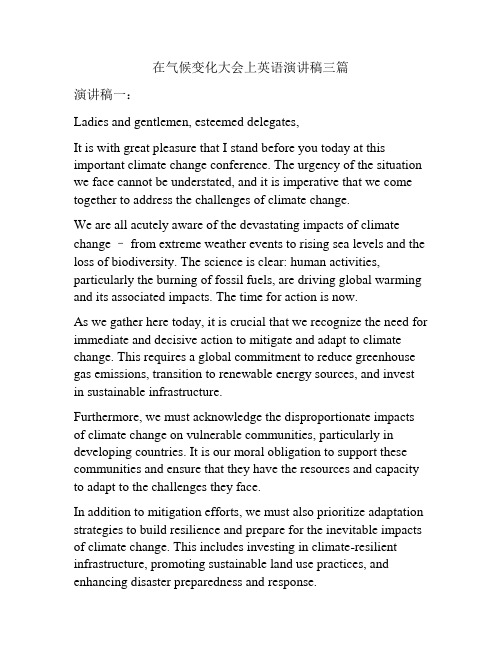
在气候变化大会上英语演讲稿三篇演讲稿一:Ladies and gentlemen, esteemed delegates,It is with great pleasure that I stand before you today at this important climate change conference. The urgency of the situation we face cannot be understated, and it is imperative that we come together to address the challenges of climate change.We are all acutely aware of the devastating impacts of climate change – from extreme weather events to rising sea levels and the loss of biodiversity. The science is clear: human activities, particularly the burning of fossil fuels, are driving global warming and its associated impacts. The time for action is now.As we gather here today, it is crucial that we recognize the need for immediate and decisive action to mitigate and adapt to climate change. This requires a global commitment to reduce greenhouse gas emissions, transition to renewable energy sources, and invest in sustainable infrastructure.Furthermore, we must acknowledge the disproportionate impacts of climate change on vulnerable communities, particularly in developing countries. It is our moral obligation to support these communities and ensure that they have the resources and capacity to adapt to the challenges they face.In addition to mitigation efforts, we must also prioritize adaptation strategies to build resilience and prepare for the inevitable impacts of climate change. This includes investing in climate-resilient infrastructure, promoting sustainable land use practices, and enhancing disaster preparedness and response.Finally, as we work towards a sustainable future, it is essential that we engage all sectors of society in the transition to a low-carbon economy. This includes governments, businesses, civil society, and individuals. We must foster collaboration and innovation to develop and implement solutions that will drive the transition to a more sustainable and resilient world.In closing, I urge all of us to seize this opportunity to make a meaningful and lasting impact on the future of our planet. Let us work together to address the challenges of climate change and create a more sustainable and equitable world for generations to come.Thank you.演讲稿二:Distinguished guests, esteemed colleagues,I am honored to address this esteemed gathering today and discuss the critical issue of climate change. As we all know, the impacts of climate change are becoming increasingly severe and are posing a significant threat to the health and well-being of our planet and its inhabitants.The scientific evidence is clear: human activities, particularly the burning of fossil fuels, are driving global warming and its associated impacts. From extreme weather events to rising sea levels and the loss of biodiversity, the consequences of climate change are far-reaching and severe. It is imperative that we take decisive action to address this urgent challenge.As we gather here today, it is essential that we recognize the need for coordinated and comprehensive efforts to mitigate and adapt toclimate change. This requires a global commitment to reduce greenhouse gas emissions, transition to renewable energy sources, and invest in sustainable infrastructure.Furthermore, we must acknowledge the disproportionate impacts of climate change on vulnerable communities, particularly in developing countries. It is our moral obligation to support these communities and ensure that they have the resources and capacity to adapt to the challenges they face.In addition to mitigation efforts, we must also prioritize adaptation strategies to build resilience and prepare for the inevitable impacts of climate change. This includes investing in climate-resilient infrastructure, promoting sustainable land use practices, and enhancing disaster preparedness and response.As we work towards a sustainable future, it is essential that we engage all sectors of society in the transition to a low-carbon economy. This includes governments, businesses, civil society, and individuals. We must foster collaboration and innovation to develop and implement solutions that will drive the transition to a more sustainable and resilient world.In closing, I urge all of us to seize this opportunity to make a meaningful and lasting impact on the future of our planet. Let us work together to address the challenges of climate change and create a more sustainable and equitable world for generations to come.Thank you.演讲稿三:Ladies and gentlemen,I am deeply honored to speak at this important climate change conference today. The urgency of the situation we face cannot be understated, and it is imperative that we come together to address the challenges of climate change.The impacts of climate change are becoming increasingly severe, with devastating consequences for the health of our planet and its inhabitants. From extreme weather events to rising sea levels and the loss of biodiversity, the consequences of climate change arefar-reaching and severe. It is imperative that we take decisive action to address this urgent challenge.As we gather here today, it is crucial that we recognize the need for immediate and decisive action to mitigate and adapt to climate change. This requires a global commitment to reduce greenhouse gas emissions, transition to renewable energy sources, and invest in sustainable infrastructure.Furthermore, we must acknowledge the disproportionate impacts of climate change on vulnerable communities, particularly in developing countries. It is our moral obligation to support these communities and ensure that they have the resources and capacity to adapt to the challenges they face.In addition to mitigation efforts, we must also prioritize adaptation strategies to build resilience and prepare for the inevitable impacts of climate change. This includes investing in climate-resilient infrastructure, promoting sustainable land use practices, and enhancing disaster preparedness and response.Finally, as we work towards a sustainable future, it is essential that we engage all sectors of society in the transition to a low-carbon economy. This includes governments, businesses, civil society, andindividuals. We must foster collaboration and innovation to develop and implement solutions that will drive the transition to a more sustainable and resilient world.In closing, I urge all of us to seize this opportunity to make a meaningful and lasting impact on the future of our planet. Let us work together to address the challenges of climate change and create a more sustainable and equitable world for generations to come.Thank you.。
- 1、下载文档前请自行甄别文档内容的完整性,平台不提供额外的编辑、内容补充、找答案等附加服务。
- 2、"仅部分预览"的文档,不可在线预览部分如存在完整性等问题,可反馈申请退款(可完整预览的文档不适用该条件!)。
- 3、如文档侵犯您的权益,请联系客服反馈,我们会尽快为您处理(人工客服工作时间:9:00-18:30)。
联合国会议发言稿在联合国气候变化会议上的讲话(中英对照) 37年来,从斯德哥尔摩到里约热内卢,从京都到巴厘岛,我们为保护全球环境、应对气候变化共同努力,取得显著成就.这是世界各国不断加深认知、不断凝聚共识、不断应对挑战的历史进程.《联合国气候变化框架公约》及其《京都议定书》已成为各方公认的应对气候变化主渠道,共同但有区别的责任原则已成为各方加强合作的基础,走可持续发展道路、实现人与自然相和谐已成为各方共同追求的目标.Globalclimatechangehasaprofoundimpactontheexistenceanddevelopmento fmankind,andisamajorchallengefacingallcountries.Inthelast37years,from StockholmtoRiodeJaneiro,andfromKyototoBali,wehavemadeconcertedefforts andachievednotableprogressinprotectingtheglobalenvironmentandtackling climatechange.Thisisahistoricprocess,throughwhichallcountrieshavedeep enedtheirunderstanding,builtconsensusandsteppedforwardtomeetthechalle nge.TheUnitedNationsFrameworkConventiononClimateChange(UNFCCC)anditsK yotoProtocolhavenowbeenuniversallyrecognizedastheprimarychanneltoaddr essclimatechange.Theprincipleofmonbutdifferentiatedresponsibilitiesha sbeenestablishedasthebasisforcloserinternationalcooperation.Andsustai nabledevelopmentandharmonybetweenmanandnaturehasbeethemongoalofallpar ties.气候变化是人类发展进程中出现的问题,.既受自然因素影响,也受人类活动影响,既是环境问题,更是发展问题,同各国发展阶段、生活方式、人口规模、资源禀赋以及国际产业分工等因素密切相关.归根到底,应对气候变化问题应该也只能在发展过程中推进,应该也只能靠共同发展来解决.Climatechangeisanissuearisinginthecourseofhumandevelopment.Itisass ociatedwithbothnaturalfactorsandhumanactivities.Itisanenvironmentalis sue,butalso,andmoreimportantly,adevelopmentissue,asitiscloselyconnect edwiththedevelopmentstage,wayoflife,sizeofpopulationandresourceendowm entofdifferentcountriesandtheirplacesintheinternationaldivisionoflabo r.Inthefinalanalysis,weshouldandcanonlyadvanceeffortstoaddressclimatechangeinthecourseofdevelopmentandmeetthechallengethroughmondevelopmen t.应对气候变化,涉及全球共同利益,更关乎广大发展中国家发展利益和人民福祉.在应对气候变化过程中,必须充分考虑发展中国家的发展阶段和基本需求.发展中国家历史排放少、人均排放低,目前受发展水平所限,缺少资金和技术,缺乏应对气候变化能力和手段,在经济全球化进程中处于国际产业链低端,承担着大量转移排放.当前,发展中国家的首要任务仍是发展经济、消除贫困、改善民生.国际社会应该重视发展中国家特别是小岛屿国家、最不发达国家、内陆国家、非洲国家的困难处境,倾听发展中国家声音,尊重发展中国家诉求,把应对气候变化和促进发展中国家发展、提高发展中国家发展内在动力和可持续发展能力紧密结合起来.Atstakeinthefightagainstclimatechangearethemoninterestsoftheentirewor ld,andthedevelopmentinterestsandpeople'swell-beingofthevastnumberofde velopingnationsinparticular.Itisimperativetogivefullconsiderationtoth edevelopmentstageandbasicneedsofdevelopingcountriesinaddressingclimat echange.Boththeirhistoricalandpercapitaemissionsarelow.Duetotheirlowd evelopmentlevelandshortageofcapitalandtechnology,developingcountriesh avelimitedcapabilityandmeanstodealwithclimatechange.Andtheyhavetobear alargeamountoftransferredemissionastheyareplacedatthelowerendoftheint ernationalindustrialchainintheprocessofeconomicglobalization.Fordevel opingcountries,thetopprioritynowistogroweconomy,eradicatepovertyandim provelivelihood.Theinternationalmunityshouldpaycloseattentiontothepre dicamentofdevelopingcountries,especiallythesmallislandstates,theleast developedcountries,landlockedcountriesandAfricancountries.Itisimporta nttolistentotheirvoiceandrespecttheirwishes,andbineoureffortstoaddres sclimatechangewiththosetopromotethegrowthofdevelopingcountriesandbuil duptheirowndynamismfordevelopmentandabilityforsustainabledevelopment.各位同事!DearColleagues,应对气候变化,实现可持续发展,是摆在我们面前一项紧迫而又长期的任务,事关人类生存环境和各国发展前途,需要各国进行不懈努力.当前,我们在共同应对气候变化方面应该坚持以下几点.Toaddressclimatechangeandachievesustainabledevelopmentisanurgentandlo ng-termtaskforallofus.Itbearsonthelivingenvironmentofmankindandthedev elopmentprospectsofallcountries,andcallsfortheunremittingeffortsofthe wholeworld.Inthisconnection,letmehighlightafewprinciplesweneedtofollo winourmonendeavortotackleclimatechange:第一,履行各自责任是核心.共同但有区别的责任原则凝聚了国际社会共识.坚持这一原则,对确保国际社会应对气候变化努力在正确轨道上前行至关重要.发达国家和发展中国家都应该积极采取行动应对气候变化.根据《联合国气候变化框架公约》及其《京都议定书》的要求,积极落实巴厘路线图谈判.发达国家应该完成《京都议定书》确定的减排任务,继续承担中期大幅量化减排指标,并为发展中国家应对气候变化提供支持.发展中国家应该根据本国国情,在发达国家资金和技术转让支持下,努力适应气候变化,尽可能减缓温室气体排放.First,fulfillingrespectiveresponsibilitiesshouldbeatthecoreofouref fort.Theprincipleofmonbutdifferentiatedresponsibilitiesembodiesthecon sensusoftheinternationalmunity.Adherencetothisprincipleiscriticaltoke epinginternationalcooperationonclimatechangeontherighttrack.Bothdevel opedanddevelopingcountriesshouldtakeactivestepstotackleclimatechange. WeshouldactinkeepingwiththeprovisionsoftheUNFCCCanditsKyotoProtocolan dadvancenegotiationsundertheBaliRoadmapinrealearnest.Developedcountri esshouldfulfillthetaskofemissionreductionsetintheKyotoProtocol,contin uetoundertakesubstantialmid-termquantifiedemissionreductiontargets,an dsupportdevelopingcountriesincounteringclimatechange.Developingcountr iesshould,inthelightoftheirnationalconditionsandwiththefinancialandte chnologicalsupportofdevelopedcountries,workhardtoadapttoclimatechange anddotheirbesttoreducegreenhousegasemissions.第二、实现互利共赢是目标.气候变化没有国界.任何国家都不可能独善其身.应对这一挑战,需要国际社会同舟共济、齐心协力.支持发展中国家应对气候变化,既是发达国家应尽的责任,也符合发达国家长远利益.我们应该树立帮助别人就是帮助自己的观念,努力实现发达国家和发展中国家双赢,实现各国利益和全人类利益共赢.Second,achievingmutualbenefitandwin-winouteshouldbethegoalofoureff ort.Climatechangerespectsnonationalborders,andnocountryisimmunefromit .Tocounterthischallengerequiresthewhole-heartedcooperationandcoordina tedactionsoftheinternationalmunity.Developedcountriesshouldsupportdev elopingcountriesintacklingclimatechange.Thisisnotonlytheirresponsibil ity,butalsoservestheirlong-terminterest.Weshouldfostertheideathathelp ingothersishelpingoneselfandmakeourendeavoronclimatechangeawin-winfor bothdevelopedanddevelopingcountriesandawin-winforboththeinterestsofin dividualcountriesandthemoninterestsofhumanity.。
